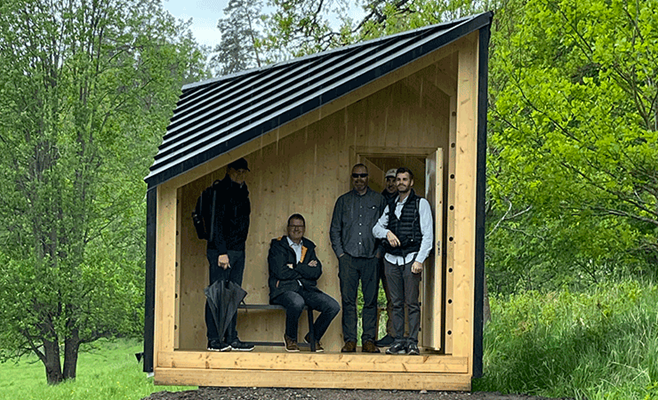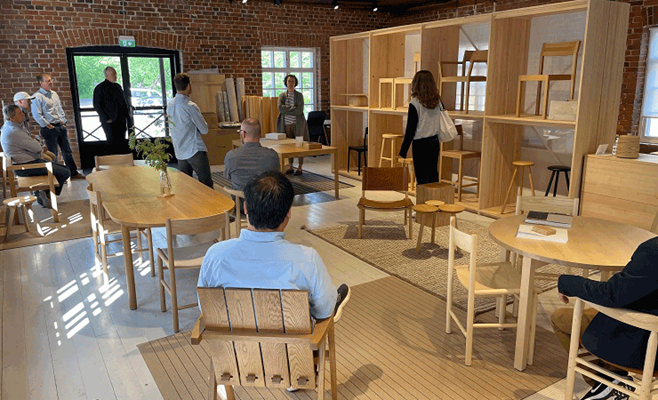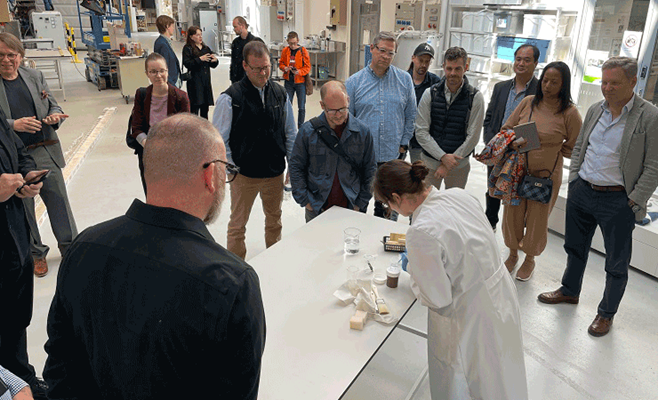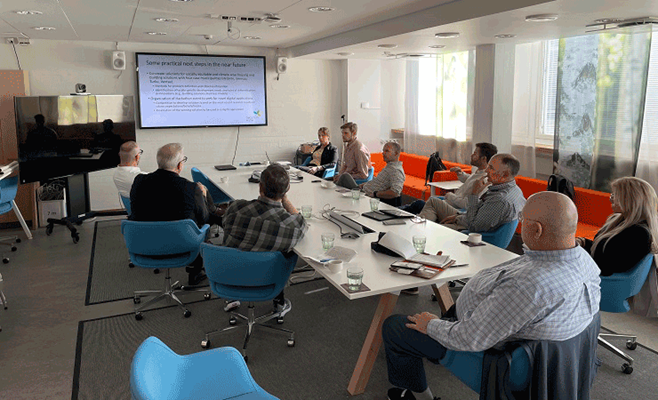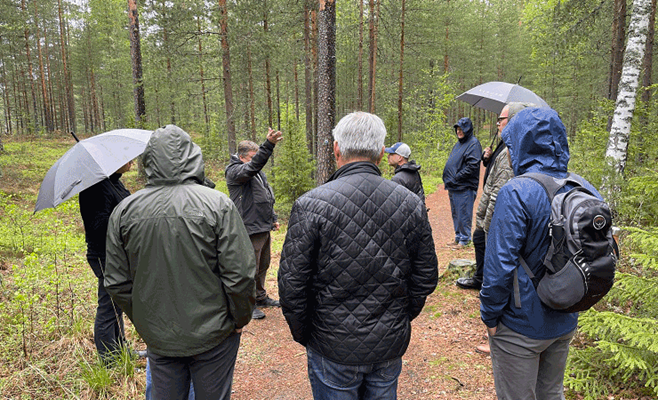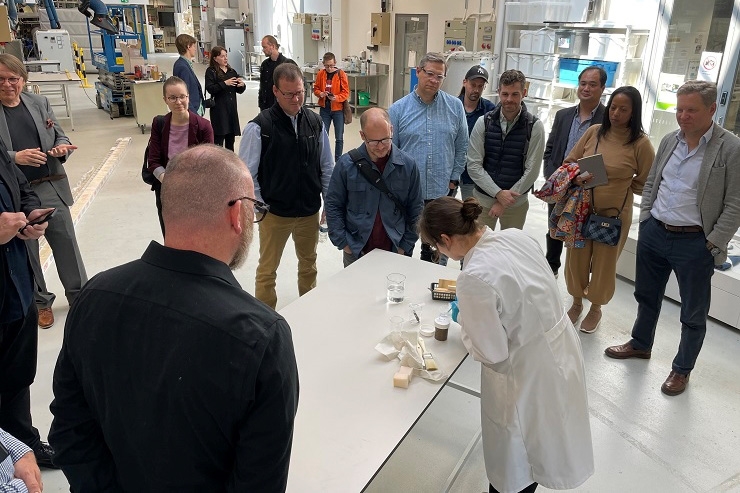
ROGERS – Finland's emergence as a global leader in forest management and wood exports can serve as a roadmap for Arkansas, which is similar in many ways to the European nation when it comes to reliance on the forestry, timber and wood products industries.
The World Trade Center Arkansas, in partnership with the University of Arkansas' Fay Jones School of Architecture and Design, learned firsthand of Finland's thriving timber industry and the nation's sustainable forestry practices, along with its intensive wood products research and innovation culture, during a 10-day trade mission to the Nordic nation in June 2022.
Led by Peter MacKeith, dean of the Fay Jones School and a 1990 Fulbright Finland Scholar, Arkansas' 10-person delegation met with numerous Finnish business and government leaders, including its Ministry of Agriculture and Forestry and Ministry of the Environment, to learn how Finland evolved into a 21st century "forest superpower," with national agendas in sustainable forest management, materials research and development, and a carbon-neutral circular economy.
"Our 10 days in Finland were an intensive introduction to the Finnish forest economy," said MacKeith, "with each day providing stimulating insights into the holistic, collaborative approach being taken by the nation to convert its 'green gold' into a durable, responsible, productive future for all its citizens. The combined efforts of the national government, the business and industry sectors, the creative and scientific academic disciplines, and the forest associations and timberland owners are a model for how a small nation (or state) can leverage its primary natural, renewable resource to the greater good."
Jason Gibson, director of business development for Weyerhaeuser, said that representing Arkansas and Weyerhaeuser on the bi-lateral trade mission to Finland was a terrific experience.
"We are working to broaden the understanding of how sustainably managed forests and wood products are part of the solution to climate change, and also to promote the many sustainable, long-term economic opportunities available through the forestry and wood products industries," Gibson said.
"Collaboration across multiple sectors and stakeholders is vital, and a strategic partnership between Finland and Arkansas could help foster the development of new and expanding markets for forest products that are essential for everyday life."
John Folan, architecture department head and professor at the Fay Jones School, noted that both Arkansas and Finland share a sense of resourcefulness, which is highlighted by university research.
"The trade delegation tangibly illustrated how that resourcefulness can be leveraged across disciplines to create economic opportunity through innovation — from nano to super scale," Folan said. "One area where this was underscored is through industry relevant applied research work executed by universities. Partnerships between industry and academia are yielding remarkable breakthroughs of great environmental benefit."
Folan also said Arkansas could benefit from fully realizing the environmental and economic value of its natural resources like their Finnish counterparts.
"Use of wood building products is well known in the architecture and construction industry, but the use of byproducts and side stream content is less so to the public at large," he said.
"The opportunity presented in understanding the benefits of nanotechnology that can positively impact sectors like the textile and modular energy industries is inspiring."
Finland has 20 million hectares (45 million acres) of forest land, meaning 75% of its land is covered by forest. Arkansas by contrast has 19 million acres of forest land, which equates to about 58% of the state covered by forest.
Roughly 12% of Arkansas' forestland is industrial, but the impact on the economy is massive. The timber industry sustained 27,702 jobs and represented $1.8 billion in income in 2021, according to data from the Arkansas Center for Forest Business.
While Finland relies on its forest for similar economic output, the country has been proactive to integrate the industry into its economic development strategy while working to ensure sustainability. Finland has developed a program to increase the use of wood in buildings while also assessing their carbon footprints. Meanwhile, the country is updating its forest management strategy from 2025 to 2035.
The ethos of sustainability is embedded in the Finnish timber industry, which struck a chord with Ben Baldwin, a project executive for Nabholz Construction Co. in Rogers.
"In many ways, likely because their economy and environment is more affected by it, I found their philosophy and initiatives toward mass timber construction to be more advanced than in the (United States)."
Jason Wright, an architect and partner at Modus Studio in Fayetteville, said that his first time in Finland was transformative.
"I can honestly say that my expectations were surpassed, and I'm still excited about the experience," he said.
"It was apparent to me that there is opportunity for collaboration between Arkansas and Finland — through economic development, architecture and design, lessons in sustainability…the list goes on. I very much look forward to a return trip to continue to strengthen the bond between our two cultures, and to continue the work started on my first visit."
Gibson, Baldwin and Wright were among several Arkansas construction managers, architects, engineers and state business leaders comprising the trade delegation, which also included several University of Arkansas officials. Others in the delegation were:
- Jake Tucci, Fay Jones School, assistant professor of interior design
- Ray Dillon, America's Car Mart, chairman of the Board
- Will Ramhold, Marlon Blackwell Architects, architect
- Ben Walters, Arkansas Economic Development Commission (AEDC), international business development manager
- Richard Welcher, Tatum, Smith, Welcher Engineers, principal
- Jana Carter, WTC Arkansas, global trade director and foreign trade policy advisor
- Denise Thomas, WTC Arkansas, CEO
Welcher, who is also an adjunct professor in the civil engineering department at the U of A, said he plans to meet with his Finnish counterparts for guidance on incorporating timber into construction projects.
"There are far fewer boundaries limiting incorporation of advanced timber technologies within building design and construction in Arkansas (and the overall country) than initially thought," he said.
"I look to interface with my Finnish structural engineering peers to learn more about how they have addressed certain structural design and performance constraints which are unaddressed in our currently adopted Codes and Standards."
Dean MacKeith summed up the success and potential outgrowths of this summer trade mission.
"The focus on forests, land use, manufacturing, design and the built environment of this delegation will inform future envisioned exchanges with Finland," MacKeith said.
"At the same time, there are numerous opportunities for mutually beneficial educational, economic and cultural exchanges between Arkansas and Finland, and the university is ideally positioned to be a catalyst in this relationship."
As the trade nexus for the Natural State, the WTC Arkansas works to grow trade and increase Arkansas exports by connecting Arkansas businesses to the world through international trade services. The center is part of the University of Arkansas and serves as the trade promotion arm for the AEDC.
The WTC Arkansas also can distribute funds from the State Trade Expansion Program (STEP) to help offset the costs for trade shows, trade missions, consulting and other export initiatives for eligible companies.
To apply for STEP funds, contact funds, contact Trish Watkins, our STEP grant director.
For more information and valuable updates, please follow the center on Facebook and Twitter or subscribe to the World Trade Center Arkansas newsletter.
Topics
Contacts
Michelle Parks, director of communications
Fay Jones School of Architecture and Design
479-575-4704,
Brandon Howard, public information specialist
World Trade Center Arkansas
479-418-4803,
